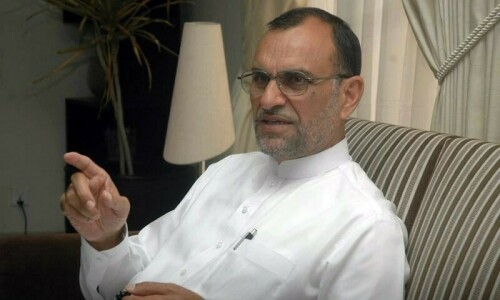ISLAMABAD, July 7: The Muslim Ummah should strengthen itself by returning to its roots and by forging unity among its ranks keeping itself aloof of the differences of sects, regions or colours.
The politicians, retired generals and spiritual leaders expressed these views while speaking at a seminar 'Struggle for Unity of the Ummah and Stability of Pakistan' organised at the National Library on Thursday by 'Islahi Jamaat and Alami Tanzeemul Arifeen', an organisation formed by the descendents of famous Sufi saint Sultan Bahu.
PML-N's Raja Zafar-ul-Haq said that unity among the Muslims was a prerequisite for strengthening the Islamic world as well as Pakistan.
He said, “Pakistan must shun fearing sanctions in case it takes its own decisions like Iran which has not surrendered its right to nuclear technology despite facing stiff sanctions by the US and its allies.” He said clash among civilizations had helped spread of Islam in the world of today.
Former foreign minister Makhdoom Shah Mehmood Qureshi called for the creation of such a bold leadership that could stand up to the world powers and said stability could not be achieved as long as people's issues were not addressed and resolved.
Former chief of army staff General (retired) Mirza Aslam Baig traced the fundamental reason of backwardness and weakness of the Muslim Ummah to what he called its deviation from its roots.
According to his research, he said, around 70 per cent of Pakistani population did not know the basics of Islam because neither the government nor the parents arranged basic education of Islam for the country's youth.
He said a handful of fearless Afghans had not only fought back a world power's might in Afghanistan but the US and Nato forces were at the verge of defeat at their hands and searching ways for an honourable exit.
He said Pakistan had fought a war against former Soviet Union at the behest of the US and the present war on terrorism was also not Pakistan's own war. Lt Gen (retired) Hameed Gul said Islam as an ideology was the basis of Pakistan which could not be compromised for the sake of western democracy and called for shunning sectarian divisions.
Former foreign minister Gohar Ayub Khan said that the people, instead of confronting each others, needed to close their ranks to save Pakistan, which he recalled was created by Quaid-i-Azam despite the stiff resistance of the Hindu-dominated Congress party.














































